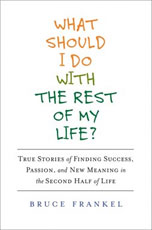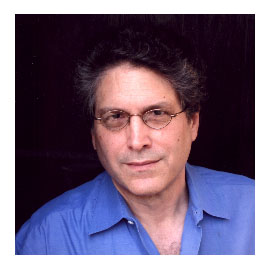What Should I Do with the Rest of My Life?
Author Bruce FrankelA review of the book by JoanP, SeniorLearn volunteer

 Before the economic downturn, many Seniors were looking forward to retirement as a time to travel, read, play golf - a time of leisure. Life has a way of interfering with such plans. Many seniors have found it necessary to continue working into the retirement years, at jobs they were looking forward to leaving behind. And for some of us who are already retired, the opportunities for open-ended leisure have proven to be unrewarding, leaving us with too much time on our hands.
Before the economic downturn, many Seniors were looking forward to retirement as a time to travel, read, play golf - a time of leisure. Life has a way of interfering with such plans. Many seniors have found it necessary to continue working into the retirement years, at jobs they were looking forward to leaving behind. And for some of us who are already retired, the opportunities for open-ended leisure have proven to be unrewarding, leaving us with too much time on our hands.
In his recently published book, "What Should I Do With the Rest of My Life," author Bruce Frankel presents us with more than a dozen profiles of individuals he calls "ordinary people who embraced new possibilities late in life - extraordinary late bloomers who have overthrown the usual expectations of age." He believes that it is never too late to redefine oneself. After compiling these profiles, Frankel sees what he calls "encouraging proof" of the vitality of those who range in age from their sixties to nearly one hundred. He sites studies to support this, but just consider the vitality of the man who became a licensed clinical psychologist at 76 and still conducts a full schedule of therapy sessions, five days a week at the age of 91! The man, Robby Iadeluca, happens also to be a Discussion Leader on our SeniorLearn web site, proposing to lead a group of people through all 11 volumes of The Story of Civilization by Will and Ariel Durant. They are on Volume V now!
But how ordinary are these people? Can we identify with them or do they possess extraordinary talent, wealth or physical fitness? Frankel begins with the story of his own mother's success at 84 following quadruple bypass surgery. After the author coaxed her to sign up for an art class, her life turned around. She began copying the great masters and at 85 she accepted her first commission painting a portrait of a man and his two sons.
Five of the women that Frankel included spent most of their lives as homemakers, caring for others. They all overcame painful losses on the way to becoming the successful and happy individuals we see in this book.
Can we take something away from the extraordinary stories of these individuals to apply to our own situation? Frankel answers this question by saying: "Age does not of itself limit or enable us. The choice is ours." The people in this book have made a choice and their stories provide inspiration. Consideration of these profiles reveal how these individuals overcame the limits of age and how their age enabled them to succeed. Frankel believes if ordinary people apply these principles to our own lives we can expect to see some major changes in how we view the world and how the world views us.
The twelve profiles in the book present an optimistic view of what retirees can accomplish, putting to use the skills and talents acquired over a lifetime.
SeniorLearn will be discussing Bruce Frankel's book and the topic of retirement on our website in August. Some of our participants will be meeting with him over tea in New York City on September 11, 2010.